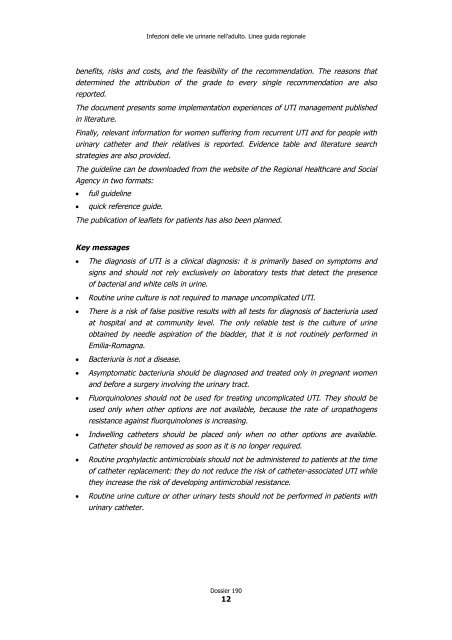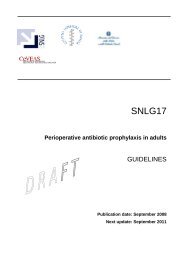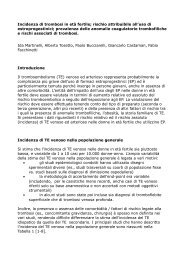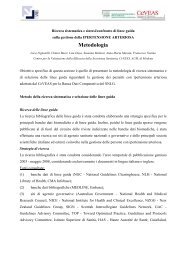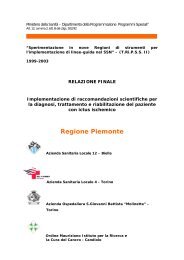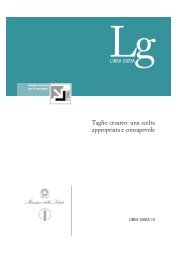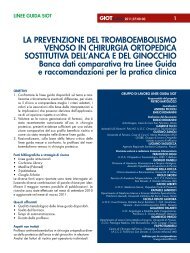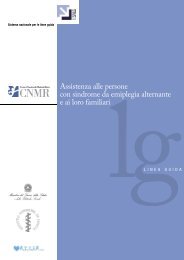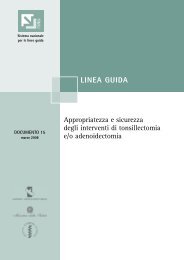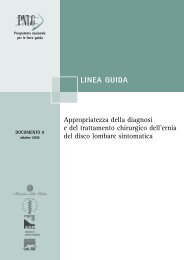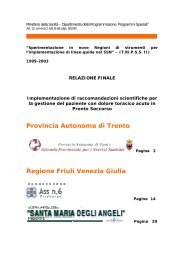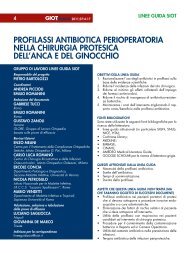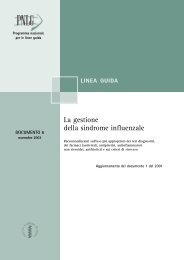Infezioni delle vie urinarie nell'adulto - SNLG-ISS
Infezioni delle vie urinarie nell'adulto - SNLG-ISS
Infezioni delle vie urinarie nell'adulto - SNLG-ISS
You also want an ePaper? Increase the reach of your titles
YUMPU automatically turns print PDFs into web optimized ePapers that Google loves.
<strong>Infezioni</strong> <strong>delle</strong> <strong>vie</strong> <strong>urinarie</strong> nell’adulto. Linea guida regionale<br />
benefits, risks and costs, and the feasibility of the recommendation. The reasons that<br />
determined the attribution of the grade to every single recommendation are also<br />
reported.<br />
The document presents some implementation experiences of UTI management published<br />
in literature.<br />
Finally, relevant information for women suffering from recurrent UTI and for people with<br />
urinary catheter and their relatives is reported. Evidence table and literature search<br />
strategies are also provided.<br />
The guideline can be downloaded from the website of the Regional Healthcare and Social<br />
Agency in two formats:<br />
full guideline<br />
quick reference guide.<br />
The publication of leaflets for patients has also been planned.<br />
Key messages<br />
<br />
<br />
<br />
<br />
<br />
<br />
<br />
<br />
<br />
The diagnosis of UTI is a clinical diagnosis: it is primarily based on symptoms and<br />
signs and should not rely exclusively on laboratory tests that detect the presence<br />
of bacterial and white cells in urine.<br />
Routine urine culture is not required to manage uncomplicated UTI.<br />
There is a risk of false positive results with all tests for diagnosis of bacteriuria used<br />
at hospital and at community level. The only reliable test is the culture of urine<br />
obtained by needle aspiration of the bladder, that it is not routinely performed in<br />
Emilia-Romagna.<br />
Bacteriuria is not a disease.<br />
Asymptomatic bacteriuria should be diagnosed and treated only in pregnant women<br />
and before a surgery involving the urinary tract.<br />
Fluorquinolones should not be used for treating uncomplicated UTI. They should be<br />
used only when other options are not available, because the rate of uropathogens<br />
resistance against fluorquinolones is increasing.<br />
Indwelling catheters should be placed only when no other options are available.<br />
Catheter should be removed as soon as it is no longer required.<br />
Routine prophylactic antimicrobials should not be administered to patients at the time<br />
of catheter replacement: they do not reduce the risk of catheter-associated UTI while<br />
they increase the risk of developing antimicrobial resistance.<br />
Routine urine culture or other urinary tests should not be performed in patients with<br />
urinary catheter.<br />
Dossier 190<br />
12


